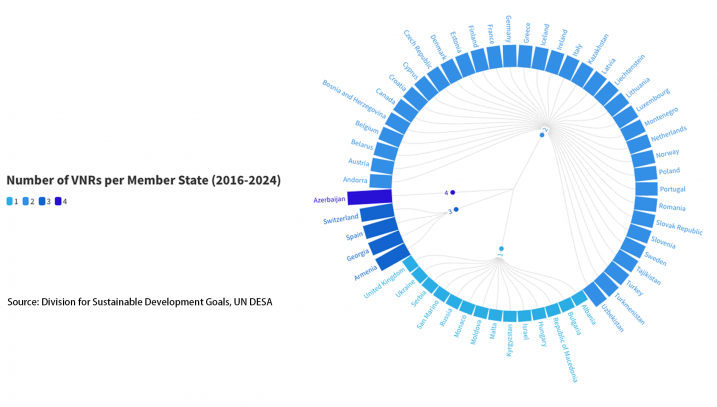Commitment to the SDGs in the UNECE region
Voluntary National Reviews (VNRs): Where we stand.

55 out of the 56 UNECE member states will have undertaken a Voluntary National Review (VNR) by 2024, which accounts for more than 98% of its membership. Specifically, 14 countries have presented their VNRs for the first time, 36 for the second time, 4 for the third time and 1 for the fourth time since 2016.
At the 2024 High-level Political Forum on Sustainable Development (HLPF), five UNECE member States are presenting their voluntary national reviews (Armenia, Austria, Azerbaijan, Georgia, and Spain). In 2023, VNRs were presented by Belgium, Bosnia and Herzegovina, Canada, Croatia, France, Iceland, Ireland, Liechtenstein, Lithuania, Poland, Portugal, Romania, Slovak Republic, Tajikistan, Turkmenistan, and Uzbekistan. Further, the European Union also presented a Voluntary Review for the first time.
Voluntary National Reviews (2016-2023) by UNECE member States and Voluntary Review by the European Union:
(Click the links to see VNRs and focal points of each member state and the European Union)
![]()
Background: What are Voluntary National Reviews (VNRs)?
The 2030 Agenda for Sustainable Development encourages all UN member states to review their national and sub-national progress in implementing and integrating the Sustainable Development Goals (SDGs) through Voluntary National Reviews (VNRs), including successes, challenges, and lessons learned.
These country-led and country-driven VNRs serve as a basis for the regular reviews by the High-level Political Forum on Sustainable Development (HLPF) – the central UN platform for the follow-up and review of the 2030 Agenda and SDGs at the global level under the auspices of the Economic and Social Council (ECOSOC). As stipulated in paragraph 84 of the 2030 Agenda, regular reviews by the HLPF are to be voluntary, state-led, undertaken by both developed and developing countries, and involve multiple stakeholders.
The UNECE region’s high participation in VNRs is proof of the strong efforts by member states to translate the SDGs into policy actions.